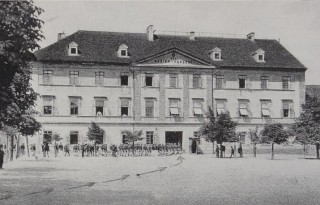
Mariánská kasárna in CB (Budweis). Until 1 June 1915 it was the home of the Good Soldier Švejk's Infanterieregiment Nr. 91. In 1915 Jaroslav Hašek also served with the regiment in these barracks.
The novel The Good Soldier Švejk refers to a number of institutions and firms, public as well as private. On these pages they were until 15 September 2013 categorised as 'Places'. This only partly makes sense as this type of entity can not always be associated with fixed geographical points, in the way that for instance cities, mountains and rivers can. This new page contains military and civilian institutions (including army units, regiments etc.), organisations, hotels, public houses, newspapers and magazines.
The line between this page and "Places" is blurred, churches do for instance rarely change location, but are still included here. Therefore Prague and Vienna will still be found in the "Places" database, because these have constant coordinates. On the other hand institutions may change location: Odvodní komise and Bendlovka are not unequivocal geographical terms so they will from now on appear on this page.
The names are colour coded according to their role in the plot, illustrated by these examples: U kalicha as a location where the plot takes place, k.u.k. Kriegsministerium mentioned in the narrative, Pražské úřední listy as part of a dialogue, and Stoletá kavárna, mentioned in an anecdote.
 Institutions index of institutions, taverns, military units, societies, periodicals ... (288)
Show all
Institutions index of institutions, taverns, military units, societies, periodicals ... (288)
Show all I. In the rear
I. In the rear  14. Švejk as military servant to senior lieutenant Lukáš (14)
14. Švejk as military servant to senior lieutenant Lukáš (14) II. At the front
II. At the front  1. Švejk's mishaps on the train (15)
1. Švejk's mishaps on the train (15) 2. Švejk's budějovická anabasis (38)
2. Švejk's budějovická anabasis (38) 3. Švejk's happenings in Királyhida (44)
3. Švejk's happenings in Királyhida (44) 4. New afflictions (26)
4. New afflictions (26)



|
I. In the rear |
 | |
5. Švejk at the district police station in Salmova street | |||
 | Emauzský klášter |  | ||||
| Praha II./320, na Slovanech 1 | ||||||
| ||||||
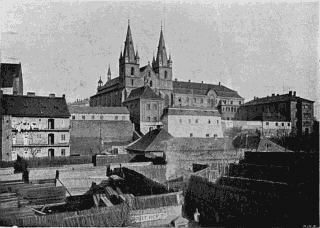
The monastery at the turn of the century
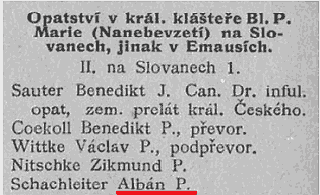
Address book 1907
Emauzský klášter is mentioned 4 times in The Good Soldier Švejk.
Emauzský klášter is the place where a monk is supposed to have hung himself in a crucifix according to Švejk. This is a story he tells his unfortunate cell-mate at Salmova ulice police station, when the latter wants to hang himself.
The monastery is mentioned again in [I.9] as the place where Feldkurat Katz was baptised. The priest who christened him was páter Albán, see páter Albán.
In [I.13] the monastery is mentioned for the third time, now by Švejk who tells Feldkurat Katz about a gardening assistant who worked there.
Background
Emauzský klášter (Emmaus Monastery) is a Benedictine monastery in Prague, located south of Karlovo náměstí. It was founded by emperor Charles IV in 1347. The abovementioned páter Albán served as abbot here from 1908 until 1918 and during the war a part of the monastery was converted to a hospital for soldiers.
After the proclamation of Czechoslovak independence on 28 October 1918 the abbot and the German monks left the country after they were subjected to harassment from crowds and militia groups. This was caused by accusations in the press, one of them being that they spied for Germany.
The monastery was badly damaged during an allied bomb raid in 1945, and was reconstructed in a somewhat different style after the war. It was confiscated by both the Nazis (1941) and the communists (1950) but was in 1990 returned to the Benedictine order.
Quote(s) from the novel
[I.5] Ledaže byste se pověsil vkleče u pryčny, jako to udělal ten mnich v klášteře v Emauzích, co se oběsil na krucifixu kvůli jedný mladý židovce.
[I.9] Křtili ho slavnostně v Emauzích. Sám páter Albán ho na máčel do křtitelnice.
[I.13] "Tak si koupíme katechismus, pane feldkurát, tam to bude," řekl Švejk, "to je jako průvodčí cizinců pro duchovní pastýře. V Emauzích pracoval v klášteře jeden zahradnickej pomocník, ...
[II.5] Tak si dal natisknout někde na Smíchově obrázky sv. Pelegrinusa a dal je posvětit v Emauzích za 200 zl.
Also written:Emmaus MonasteryenEmmausklosterdeCloître d'EmmaüsfrEmmausklosteretno
Literature
- Pohled do vojenské nemocnice v pražském klášteře emauzském, ,2.10.1914
- Historie Emauzského opatství,
- Klášter Emauzy, Zdeňka Kuchyňová
 | Bendlovka |  | |||||
| Praha II./1867, Fügnerovo nám. 2 | |||||||
| |||||||

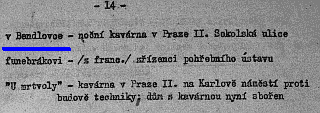
Břetislav Hůla, 1951
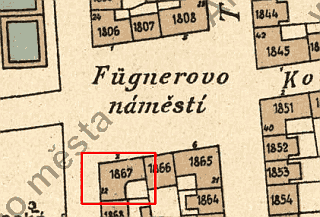
© AHMP
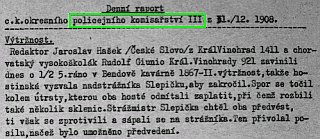
Denní raport - c.k. okresního policejního komisařství III.z. 31./12. 1908
Bendlovka is mentioned in a story Švejk "comforts" his cell-mate at Policejní komisařství Salmova ulice with. Švejk had once at Bendlovka slapped an undertaker, who had returned the compliment. The next day it was in the newspapers.
Background
Bendlovka is by near certainty an alternative term for Bendova kavárna (also Bendovka), a former tavern in Nové město that Jaroslav Hašek knew well. In his explanations from 1951 Břetislav Hůla identifies it as a night-café in Sokolská ulice and is supported by Radko Pytlík who locates it to the corner of Sokolská and Fügnerovo náměstí. The location was next to Apollo, and on the opposite corner of the square was U Šolců, another of Hašek's favourite taverns.
Hašek and Bendovka
A well documented incident that involved the author took place here on 31 December 1908. According to police reports Jaroslav Hašek was involved in a brawl in the café during the small hours of the morning. He and Croatian technical student Rudolf Giunio refused to pay the bill, an argument erupted and glasses were broken. When the patrol-man Slepička arrived the humorist knocked the hat off his head so reinforcements were called. The two troublemakers were subsequently taken to Policejní komisařství Salmova ulice and were released the next morning.
Opočenský remembers
Another brawl involving the author is recorded by his friend Gustav Roger Opočenský’s in his book about Jaroslav Hašek (1948). It was written almost 40 years after the incident, but there is little reason to doubt the essence of the story: a clash between the author and some employee of a funeral agency erupted at Bendovka. It took place “in the small hours of one hot spring Saturday evening, a few years before the war”. This story has certain parallels to both the 1908 incident, but also to the passage in The Good Soldier Švejk. Otherwise Opočenský writes that Bendova kavárna offered live music, had marble tables, and was open until early in the morning, and the beer was cheap and poor. By the time he wrote his book the premises were occupied by some printing works.
Strána mírného pokroku
Jaroslav Hašek devotes a story to Opočenský in his collection of tales about Strana mírného pokroku v mezích zákona and also here the night café is mentioned (as Bendova kavárna) and even in the same breath as Apollo. In another story the term "v Bendlovce" is used in the same manner as in the novel. It seems to refer to a tavern (or at least a place where people met). Jaroslav Hašek had a few showdowns with a certain editor of České slovo here. The editor was of “Mosaic confession”.
In the papers
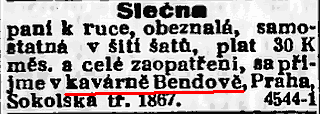
, 20.8.1910

, 3.11.1907
Newspaper reports confirm some of the information from Opočenský and also adds information about dancing arrangements. The café was operating at least from 1900 until the autumn of 1914, but at two locations. In the spring of 1905 the license of Marie Bendová was transferred from Nové město house No. 1816 to No. 1867. An advert from the first autumn of war reveals that opening times were by now shortened, to two in the morning, a common occurrence all over Austria-Hungary after the war broke out.
From time to time adverts seeking employees appeared, but reports about thefts, drunkenness and fighting were more prominent. Jaroslav Hašek was not the only troublemaker here. Here are just some of the incidents: in 1908 three German students caused serious trouble (reported in several newspapers) and in 1913 a stabbing incident was reported by Čech.
Quote(s) from the novel
[I.5] Nebo v Bendlovce jsem dal jednou jednomu funebrákovi facku a on mně ji vrátil. Abychom se smířili, museli nás oba zatknout, a hned to bylo v odpoledníčku.
Credit: Hůla, Radko Pytlík, Jaroslav Šerák, Gustav Roger Opočenský
Literature
- Kavárenská straka, ,14.4.1900
- Přeložení živnosti bylo schváleno, ,5.4.1905
- Bendova kavárna, ,8.9.1907
- Pozor! Taneční zabáva!, ,31.12.1907
- Z nočního působení buršáků, ,21.11.1908
- Krvavá noční rvačka, ,11.3.1913
- Pomstil se, ,28.12.1913
- Kavárna Benda, ,8.11.1914
 | U mrtvoly |  | ||||
| Praha II./310, Karlovo nám. 13 | ||||||
| ||||||
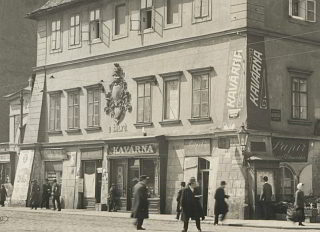
Picture from 1926
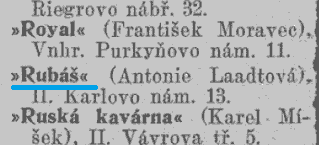

Břetislav Hůla
U mrtvoly is mentioned in a story Švejk tells to "encourage" his fellow prisoner Policejní komisařství Salmova ulice. See Bendlovka.
Background
U mrtvoly (At the Corpse) has not been identified with certainty, but was in all probability a café at Karlovo náměstí, at the corner of Resslova ulice. The building which amongst others housed Pivovar U Šálků was demolished in 1939. There was a kavárna in the building, with entrance at Karlovo náměstí but the pictures do not reveal any name.
The address book from 1910 has an entry café "Rubáš" here and this gives a hint: "Rubáš" means "shroud" and "mrtvola" means "carcass/body". Břetislav Hůla states that U mrtvoly was a café opposite the technical college and this fits well.The owner in 1910 was Antonie Laadtová who in 1901 obtained the license to run the café[a].
A newspaper article in Národní listy in 1922 reveals that it by then had been renamed Děvín[b], but no further information relating to this name has been found. Vilém Mrštík also mentions the place in his novel Santa Lucia from 1893.
Quote(s) from the novel
[I.5] Nebo když v kavárně „U mrtvoly“ rozbil ten pan rada dva tácky, myslíte, že ho šetřili? Byl taky na druhej den hned v novinách.
Credit: Hůla, Jaroslav Šerák
Also written:At the CorpseenZum LeichnamdeVed Liketno
Literature
- Románové restaurační a jiné zábavní podniky, ,2009 - 2021
- Koncese hostinské obdrželi, ,19.6.1901 [a]
- Pražské noční lokály, ,15.11.1922 [b]
| a | Koncese hostinské obdrželi | 19.6.1901 | |
| b | Pražské noční lokály | 15.11.1922 |
 | Strážnice |  | |||
| Praha II./507, Ječná ul. 6 | |||||
| |||||

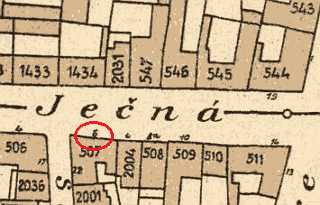
Strážnice is briefly mentioned when Švejk is led onwards from the police station in Salmovská ulice. From the novel it is clear that the guard is on street level because Švejk was interrogated on the first floor and was taken down to the guard room before he was escorted onwards.
Background
Strážnice (Guardroom) was the guard house at the police station at Salmovská ulice. It was located in the same building as the police station but the entrance was from Ječná ulice. See Policejní komisařství Salmova ulice.
Quote(s) from the novel
[I.5] Ukloniv se uctivě, odcházel s policejním strážníkem dolů na strážnici a za čtvrt hodiny bylo již vidět na rohu Ječné ulice a Karlova náměstí Švejka v průvodu druhého policejního strážníka, který měl pod paždí objemnou knihu s německým nápisem „Arrestantenbuch“.
Also written:GuardroomenWachstubedeVaktromno



|
I. In the rear |
 | |
5. Švejk at the district police station in Salmova street | |||
| © 2008 - 2024 Jomar Hønsi | Last updated: 20.11.2024 |


